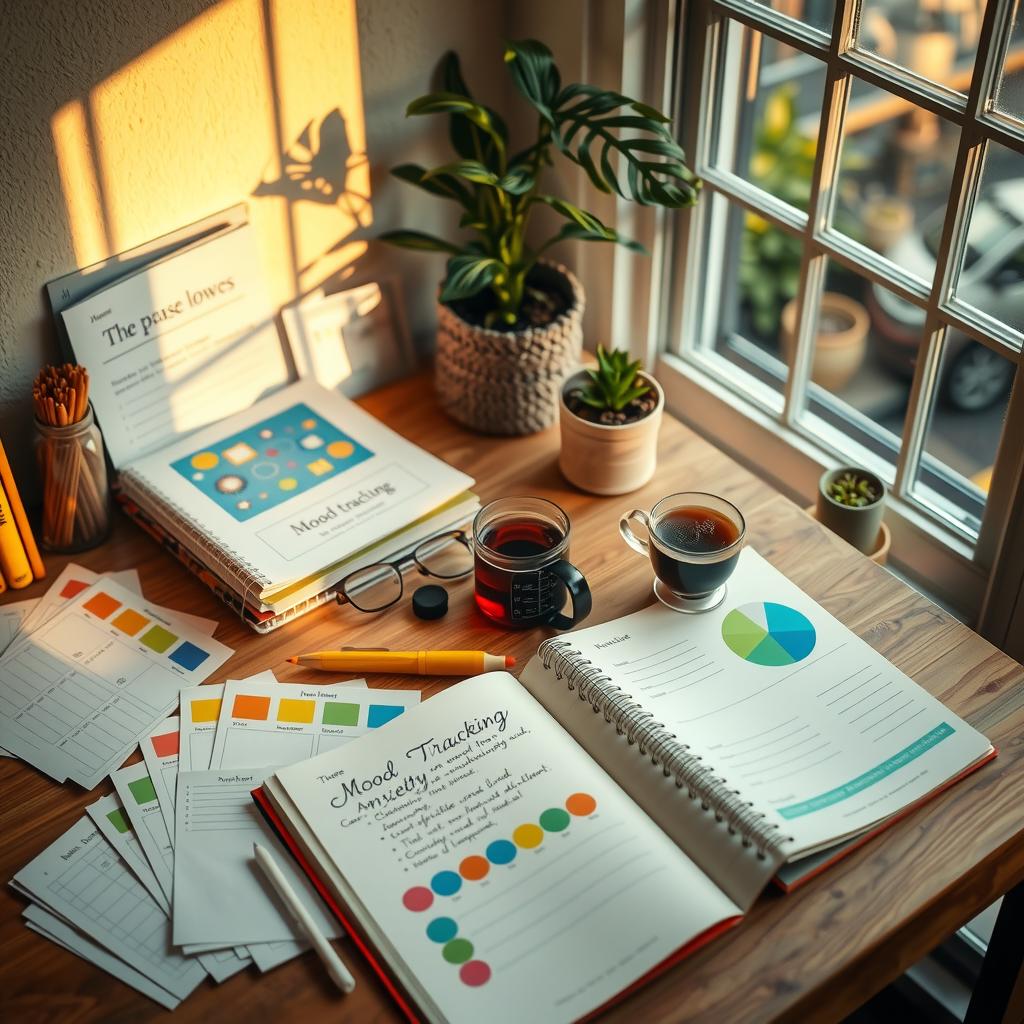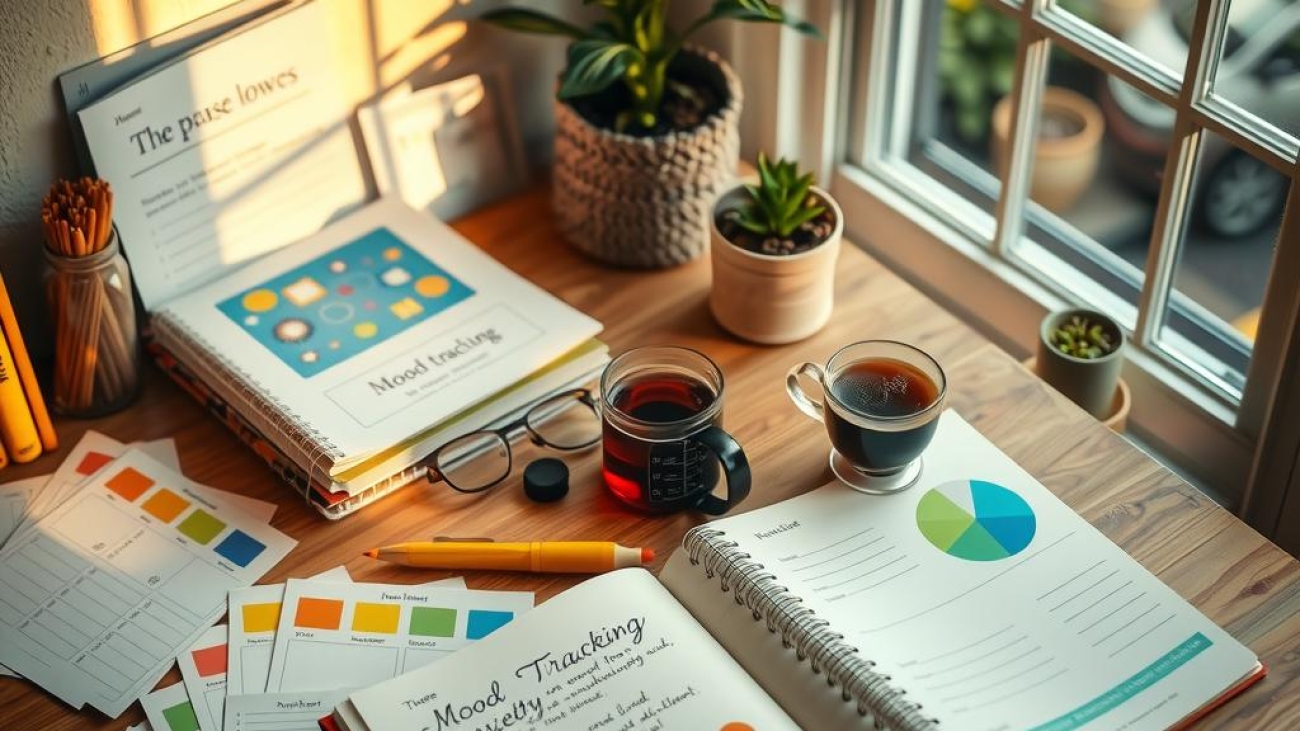In today’s fast-paced world, anxiety has become a common struggle for many individuals. The increasing pressure from work, personal life, and societal expectations can lead to overwhelming feelings of stress that are often difficult to navigate. This phenomenon not only affects daily functioning but also significantly impacts one’s overall mental health and emotional wellbeing. As anxiety becomes more prevalent, the need for effective anxiety monitoring techniques grows stronger than ever. One powerful tool in this journey is the use of Weekly mood tracking templates—a proactive approach towards understanding emotional patterns and triggers.
These templates serve as invaluable resources for anyone seeking clarity amidst chaos. By systematically documenting moods on a weekly basis, individuals can gain insight into their emotional fluctuations and identify specific situations or events that contribute to heightened anxiety levels. This process transforms abstract feelings into concrete data, allowing users to see trends over time that may otherwise go unnoticed. With each entry in the Weekly mood tracking templates, they are not just recording emotions; they are engaging in critical self-assessment—a key strategy in any comprehensive stress management plan.
Moreover, these templates support the development of effective anxiety relief strategies. Users can pinpoint which coping mechanisms yield positive results during low periods while recognizing what exacerbates their stress levels during high periods. By fostering this kind of self-awareness through consistent documentation with Weekly mood tracking templates, readers will discover personalized methods to mitigate anxiety symptoms effectively.
The beauty of integrating these tools lies in their simplicity yet profound impact on one’s quality of life. Whether it is through journaling emotions at week’s end or reflecting on progress made over time, the act itself promotes mindfulness—a crucial aspect often overlooked when dealing with stressors day-to-day. Thus begins an empowering cycle: as individuals commit to regular reflections using Weekly mood tracking templates, they empower themselves with knowledge that fosters resilience against future challenges.
In essence, this blog post delves deeper into how these practical tools can be seamlessly integrated into everyday routines—offering insights tailored specifically for those grappling with anxious thoughts or feelings. Through shared experiences and helpful tips surrounding mood documentation practices, readers will find encouragement along their path toward improved mental health. So let us explore further how adopting these simple yet effective strategies could change lives for the better!

Key Points:
-
The Significance of Mood Tracking: Understanding one’s emotional landscape is essential for effective anxiety monitoring. By employing Weekly mood tracking templates, individuals can systematically document their feelings, which illuminates patterns and triggers over time. This structured approach not only aids in identifying stressors but also promotes a deeper awareness of how daily activities influence overall mental health.
-
Enhancing Emotional Resilience: Utilizing Weekly mood tracking templates serves as a proactive measure to bolster emotional resilience. Regularly engaging with these self-assessment tools allows users to pinpoint specific situations that heighten anxiety levels. Consequently, this empowers them to implement tailored anxiety relief strategies, making informed decisions about lifestyle changes that support their mental well-being.
-
Integrating Mood Tracking into Daily Life: The practical application of Weekly mood tracking templates can seamlessly fit into one’s routine, fostering accountability in the journey toward better mental health. By committing to regular reflection on emotions and thoughts through these templates, individuals enhance their capacity for stress management, ultimately paving the way for improved emotional regulation amidst life’s challenges.

Understanding Anxiety: The Importance of Emotional Awareness
Cultivating Insight for Improved Mental Health Management
In the journey toward better mental health, understanding anxiety through emotional awareness can be a transformative experience. Recognizing the signs and triggers of anxiety allows individuals to gain insight into their emotional responses, paving the way for effective stress management strategies. When individuals engage in anxiety monitoring, they become more attuned to their feelings, enabling them to identify patterns that contribute to heightened stress levels. Utilizing tools such as weekly mood tracking templates can greatly enhance this process by providing a structured approach to self-assessment. By recording emotions regularly, one gains clarity on what factors exacerbate or alleviate anxiety, fostering a deeper connection with personal well-being.
Moreover, emotional awareness serves as an essential foundation for developing tailored anxiety relief strategies. Individuals who understand their emotional landscape are better equipped to implement coping mechanisms suited specifically to their needs—be it mindfulness practices or physical activities that promote relaxation and balance. In conjunction with these strategies, incorporating self-assessment tools such as weekly reflections helps solidify progress and maintain motivation towards achieving mental stability. This continuous loop of reflection and adjustment not only empowers individuals but also reinforces positive behavioral changes over time.
Furthermore, the act of acknowledging one’s feelings diminishes stigma associated with anxiety conditions; thus promoting healthier conversations around mental health challenges within communities. Emotional well-being is often interconnected with social support networks; when people openly discuss their experiences with anxiety—and share insights gained from mood tracking—it cultivates an environment where others feel encouraged to seek help too. By normalizing these discussions through shared experiences documented in weekly templates, we can collectively work towards breaking down barriers that inhibit open dialogue about mental health.
Lastly, understanding anxiety requires patience and practice—a commitment bolstered by consistent usage of tools like mood trackers that foster accountability in managing one’s emotional state over time. As individuals enhance their ability to recognize symptoms early on through regular tracking exercises—paired with actionable steps informed by insights—they build resilience against future episodes of distressing emotions or overwhelming situations. Ultimately, cultivating emotional awareness not only aids in immediate management but lays down a sustainable framework for long-term mental health wellness where proactive measures take precedence over reactive ones.
By embracing this holistic approach—wherein anxiety monitoring, structured self-reflection via weekly templates are seamlessly integrated into daily life—individuals position themselves favorably within the realm of mental health maintenance while nurturing profound connections between mind-body synergy essential for lasting peace amidst life’s inevitable pressures.

The Transformative Power of Weekly Mood Tracking
Unlocking Emotional Insights through Consistent Monitoring
Weekly mood tracking serves as a powerful tool for self-reflection, allowing individuals to gain valuable insights into their emotional landscapes. By utilizing weekly mood tracking templates, one can systematically monitor emotional trends over time, providing clarity in the often chaotic realm of mental health. Such templates facilitate the identification of patterns that may not be immediately apparent in day-to-day life. For instance, an individual might notice that feelings of anxiety peak every Monday morning—an important revelation that could lead to proactive stress management strategies. Furthermore, documenting emotions weekly encourages accountability and fosters discipline in one’s self-assessment practices.
Understanding Emotional Trends with Structured Tools
Incorporating mood tracking into daily routines can significantly enhance overall well-being by enabling users to visualize their emotional fluctuations. With structured tools like weekly templates, individuals can categorize their feelings and correlate them with specific events or circumstances throughout the week. This methodical approach not only aids in recognizing triggers but also assists in developing effective anxiety relief strategies. For example, after consistently logging high levels of stress during meetings at work, a person might decide to adopt relaxation techniques beforehand or seek support from colleagues. Thus, these templates become instrumental not just for recording moods but also for initiating constructive changes in one’s lifestyle.
Promoting Mental Health Through Regular Self-Assessment
The practice of using mood tracking is essential for promoting mental health awareness and understanding personal emotional needs better. As users reflect on their logs filled with various emotions such as happiness, frustration, or sadness captured through weekly mood tracking templates, they cultivate a deeper connection with themselves. This introspection lays the groundwork for improved communication regarding one’s feelings—not only internally but also externally within relationships and social circles. By sharing this data with therapists or trusted confidants during sessions or discussions about well-being—whether it’s related to managing stress or addressing anxiety—the user empowers themselves further towards achieving emotional wellbeing.
Enhancing Resilience Against Stress
Engaging regularly with one’s emotions provides significant advantages when it comes to resilience against stress and anxiety-induced challenges inherent in modern life today; thus emphasizing how beneficial consistent usage of weekly mood tracking templates truly is! They act as both reflective surfaces and proactive guides toward healthier coping mechanisms tailored specifically based on individual experiences documented over time rather than relying solely on fleeting impressions post-event occurrences without context provided by thorough records kept diligently via said-template systems used weekly! Consequently leading robust positive outcomes ultimately benefiting both mind & body holistically!
Enabling Personal Growth Through Reflection
Ultimately embracing frequent habit-forming activities such as maintaining accurate entries via accessible platforms designed around facilitating effective use while focusing primarily upon fostering enhanced insight surrounding state-of-mind shifts experienced regularly enriches growth personally whilst simultaneously serving functional purposes across broader contexts involving workplace dynamics family interactions etc., thereby illuminating pathways forward toward achieving lasting satisfaction derived from ongoing journeys navigating life’s complexities! The integration process harnessed effectively alongside identifying constructive solutions stemming directly influenced behaviors tracked successfully ensures potent results achieved laying foundations solidifying future endeavors aimed improving quality lives lived fully rounded enriching ways possible leveraging insights gleaned fruitful reflective practices instilled consistently cultivating overall balance sought after persistently striving find peace within oneself amidst external uncertainties faced daily navigating contemporary society realistically together collaboratively nurturing environments conducive flourishing thriving sustainably long-term success envisioned ahead!
Seamless Integration of Mood Tracking into Your Daily Routine
Finding Balance in Everyday Life
Integrating mood tracking into daily life can significantly enhance one’s understanding of emotional wellbeing. By employing Weekly mood tracking templates, individuals can create a structured approach to monitor their emotions, which is vital for mental health management. One effective strategy is to allocate specific times during the day dedicated solely to this task. For instance, setting aside ten minutes each morning or evening can help establish a routine that fits naturally into one’s schedule. During these sessions, users should reflect on their feelings and record any relevant situations that influenced their mood throughout the day. This practice not only fosters self-awareness but also aids in identifying patterns related to anxiety and stress levels over time.
Making Mood Tracking Enjoyable
Transforming Data Collection Into a Positive Experience
The process of mood tracking need not be tedious; instead, it can become an enjoyable ritual within one’s daily activities. Incorporating elements such as color-coding moods or utilizing engaging apps alongside Weekly mood tracking templates can make this experience more interactive and visually appealing. For example, associating different colors with various emotions allows individuals to quickly assess their mental state at a glance while providing an artistic outlet for expression. Additionally, pairing this activity with relaxing environments—like journaling outdoors or creating vision boards—can enhance the overall experience and promote mindfulness as part of anxiety relief strategies.
Utilizing Technology for Consistent Monitoring
Leveraging Modern Tools for Enhanced Engagement
In today’s digital age, technology offers numerous tools designed to facilitate consistent mood monitoring effortlessly. Many applications provide customizable features that allow users to set reminders for recording their moods while offering insights based on past entries using Weekly mood tracking templates tailored specifically for personal needs. These platforms often include data visualization tools which illustrate trends in emotional fluctuations over weeks or months—a valuable asset when assessing mental health progress or setbacks due to external factors like work-related stressors or personal relationships dynamics.
The Importance of Reflection
Building Insight Through Regular Review Sessions
Consistent reflection on recorded moods through Weekly mood tracking templates provides a deeper understanding of emotional triggers and coping mechanisms developed over time. Establishing weekly review sessions encourages individuals not just to look back at past entries but also discern actionable steps towards improvement in areas identified as problematic during assessments—be it managing workplace pressures or enhancing social interactions affected by anxiety levels experienced previously documented through careful logging practices established earlier in the week.
Turning Insights Into Action
Creating Effective Strategies Based on Self-Assessment
Finally, translating insights gained from regular use of Weekly mood tracking templates into tangible action plans forms a crucial step toward long-term emotional wellness goals focused around self-improvement pursuits aimed explicitly at cultivating resilience against everyday stresses encountered along life’s journey! Individuals may find themselves developing personalized anxiety monitoring frameworks tailored precisely according unique needs observed via comprehensive analysis conducted regularly across multiple weeks/months’ worth information collected diligently throughout varying circumstances faced moving forward together strengthening mind-body connection ultimately leading enhanced quality living experiences overall reflecting holistic growth achieved henceforth!
In today’s fast-paced world, managing anxiety and enhancing emotional wellbeing can often feel overwhelming. However, individuals can effectively navigate their mental health challenges by employing Weekly mood tracking templates. These structured tools enable users to monitor their emotional states consistently, offering a clearer perspective on the factors influencing their anxiety levels. Through regular engagement with these templates, individuals become more adept at recognizing patterns in their moods and identifying specific triggers that may contribute to feelings of stress.
One of the most significant benefits of utilizing weekly mood tracking templates is the enhanced self-awareness they foster. By documenting emotions regularly, users not only hold themselves accountable for their mental health but also gain insights into how daily habits—such as sleep quality or dietary choices—impact overall wellbeing. This process serves as an effective form of anxiety monitoring, allowing individuals to adjust lifestyle factors and develop personalized coping strategies tailored to mitigate stress responses.
Moreover, integrating Weekly mood tracking templates into one’s routine promotes proactive mental health management. As individuals reflect on their emotions weekly, they can pinpoint interactions or situations that exacerbate anxiety. This knowledge empowers them to implement effective anxiety relief strategies based on informed decisions rather than reactive measures. By transforming awareness into action through these self-assessment tools, people are better equipped to enhance resilience against life’s inevitable stresses.
FAQ:
Q: How do weekly mood tracking templates help with anxiety?
A: Weekly mood tracking templates assist in identifying patterns and triggers related to anxiety by encouraging consistent reflection on emotions and thoughts.
Q: Can using mood tracking improve my overall well-being?
A: Yes! Utilizing mood tracking promotes greater self-awareness and helps tailor coping mechanisms for better emotional wellbeing over time.
Q: What should I include in my weekly mood tracker?
A: It’s beneficial to track your daily moods alongside factors such as sleep quality, diet, exercise routines, and significant life events that could influence your emotional state.

Add a Comment